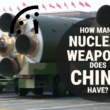Why US nuclear modernization is necessary
By Matthew Kroenig, January 8, 2015
My childhood dream was to star in the National Basketball Association. But I stand only six feet one inch tall, I'm entering my late 30s, and I haven't played competitive basketball in over 15 years. My chances of playing at the professional level are essentially zero. Some might argue that, if I am to have any hope of realizing my boyhood wish, I should spend my days running wind sprints and practicing free throws. But that path would improve my chances from none to extremely slim, and would certainly take away from my duties as a professor, researcher, and analyst. In the end, it simply isn't worth ruining the life I have in order to chase a fantasy.
The same can be said of the United States' choices regarding its nuclear posture. Over the next decade and beyond, the United States will go through a much-needed modernization of its aging nuclear capabilities, and these plans enjoy strong bipartisan support. But some critics argue that the modernization project conflicts with stated disarmament goals, including President Obama's vision of bringing about "a world without nuclear weapons."
The fact, however, is that the world is characterized by intense security competition and sometimes outright conflict. Though some observers hoped that the end of the Cold War would bring the end of history, political discord among great powers has returned in recent years. Russia is using force to redraw the map of Europe. China is asserting revisionist territorial claims in East Asia. Over the past two decades, conventional military dominance has allowed the United States to de-emphasize its nuclear weapons, but the US conventional advantage is eroding as Russia and especially China build up their non-nuclear military capabilities. Moreover, nuclear weapons remain the ultimate instrument of military power—and Washington's potential adversaries, including Russia, China, and North Korea, are modernizing their nuclear arsenals with an eye toward using those weapons in the event of conflict with the United States.
This is reality.
Nonetheless, some argue that achieving the fond hope of complete nuclear disarmament requires the United States to cut its arsenal and refuse to modernize its forces. But other countries will not blindly follow Washington's lead. In recent years, as the United States has slashed the size of its arsenal, other countries have moved in the opposite direction, building up their nuclear forces. Complete nuclear disarmament may be desirable, but achieving it will require nothing less than a major transformation of the international political system. Simply allowing the US arsenal to rust away, therefore, will not meaningfully affect chances for eliminating nuclear weapons worldwide.
Failure to modernize would not contribute to disarmament—but more than that, it would be irresponsible. A crippled US nuclear force would embolden enemies, frighten allies, generate international instability, and undermine US national security. In other words, it would risk ruining the world that currently exists.
Rather than preparing for an alternate reality, therefore, Washington needs to build the nuclear forces that it needs in this reality. The United States must maintain a robust nuclear posture and fully modernize its nuclear forces, as planned. This means upgrading all three legs of the nuclear triad, refurbishing nuclear warheads, modernizing the production complex, and, if necessary, summoning the political will to build new capabilities to meet new demands. As Defense Secretary Chuck Hagel put it in November, "Our nuclear deterrent plays a critical role in assuring US national security, and it is [the Defense Department's] highest priority mission. No other capability we have is more important."
Some might argue that modernization in the United States will spur reactions in other states, contributing to a new arms race—but, as pointed out above, modernization plans are proceeding apace in the rest of the world quite apart from any decisions being made in Washington. Critics also cite cost as an obstacle, but, at its peak, the nuclear upgrades will only account for around 5 percent of the defense budget. Thus, nuclear weapons provide a strategic deterrent at a reasonable price. Or, as incoming Defense Secretary Ashton Carter said in 2013, "nuclear weapons don't actually cost that much."
In sum, there is no good reason for the United States not to follow through on its planned modernization of nuclear forces. Perhaps one day we will be pleasantly surprised by an opportunity to live out our fantasies. But until then, we must live up to our responsibilities.
Topics: Nuclear Weapons
Share: [addthis tool="addthis_inline_share_toolbox"]














